Solar Refrigerator
Sonali Patil1
Abstract - Solarenergyisoneofthemostrenewableenergy sourceswithseveralbenefits.[1]Solarpowerwaschosenasan alternativeenergysourceforthisapplicationbecausesunlight is a resource that coastal towns without an electricity infrastructure may use. The stool design is separated into threeparts:coolingdesign,installationofenergysources,and linking to energy sources. Solar refrigeration refers to a refrigeratorthatrunsonpowergeneratedbysolarpanels. Solar-powered dead refrigerators may become more widespreadinthefuturegeneration.Today,theexpanding interestandgrowingmarketforrefrigeration.[2]Developing theworldtohelpmitigateclimatechanges.Itcan'tsistmainly two types rechargeable and non-rechargeable. This paper providesresearchaboutsolarrefrigeratorandhowitworks.
Key Words: Solar Energy, Refrigerator, Utilized, Regeneration.
1. INTRODUCTION
Refrigerationisaprocedurethatinvolvesmovingsomething from one area to another. Solar refrigeration is a refrigerator that runs on electricity generated by solar energy. Solar power dead refrigerators may be most common in future generations developing the to help combatpovertyandclimatechange.
•SolarRefrigerationSystemTypes:
1.Rechargeable
2.non-Rechargeable
a)Photovoltaicrefrigeration
b)Solarmechanicalrefrigeration
c)Absorptionrefrigeration
The refrigerant used is governed by the needed cooling temperature. Solar refrigeration is used to reduce energy consumptioninplacesthatarenotlinkedtotheelectricity grid.
Theimpactontheenvironmentandthecostofgasolineare twofactorstoconsider.Energyconsumptionisincreasingas the population and economy develop. The usage of fossil fuels will worsen the environment. Refrigeration and air conditioning are rising businesses as people's lifestyles change.Theyarealsonecessaryforincreasingtheshelflife of fruits and vegetables, as well as storing certain medications and vaccinations. Refrigeration and air conditioning are rising businesses as people's lifestyles
change.Theyarealsonecessaryforincreasingtheshelflife of fruits and vegetables, as well as storing certain medicationsandvaccinations.TheDepartmentofHealthis concentratingonemployingsolar-poweredrefrigeratorsto keepvaccinationsatthecorrecttemperatureforsuccessful usageinremotepartsoftheRiauIslands.Recently,energy conservationandmitigatingtheeffectsofglobalwarming haveemergedastwooftheworld'smostpressingissues. Becausetheamountofenergyconsumedby refrigeration systemsintotalenergyconsumptioniscontinuallygrowing, these systems are being researched. Recently, energy conservationandmitigatingtheeffectsofglobalwarming haveemergedastwooftheworld'smostpressingissues. Thermomechanical,absorption,adsorption,anddesiccant solutionsareallpartofsolarthermalsystems.[7]

Asweallknow,ourfossilfuelsupplies,suchascoaland petroleum, are dwindling by the day. As a result, we are shiftingtowardsrenewableenergysources.Sunenergyis oneoftherenewableenergyalternativesthatisabundant andmaybeusedtogeneratepower.
1. Provideastoragesystem(refrigerator)inruralareas whenelectricityisunavailable:Thereisanissuewith electricity in rural areas. And without electricity, there were several issues,suchasproductstorage. Theyareunabletopreservevegetables,medications that must be stored at temperatures below 8oC or 10oC,andsoon.Onlyrefrigeration,whenpowered by a solar PV panel, can meet the needs of rural residentsforkeepingproducts.
2. Provide a backup storage system at night: because there is no sunshine at night, producing power via solar panels is not viable. However, the problem is being remediedbystoringcoolnessduringtheday using a battery. As a result, the second goal of the research is to keep the temperature below 15 degreesCelsiusatnight.[1]
2. DESIGN & DEVELOPMENT
Therefrigerationdeviceismadeupoffiveparts:asolar cell, a solar charge controller, a battery, an inverter, anda refrigerator.AsseeninFig.1[1],
Refrigeration system is boredly classified into three types:
A solar Rankine cycle provides the needed compressor powertooperatethecompressorintherefrigerationcyclein this sort of refrigeration system. The solar panel absorbs sunlight,whichpowersaRankinecycleandgenerateswork intheturbine.Thiseffortisthenusedtopowerthevapours compressionrefrigerationsystem'scompressor.
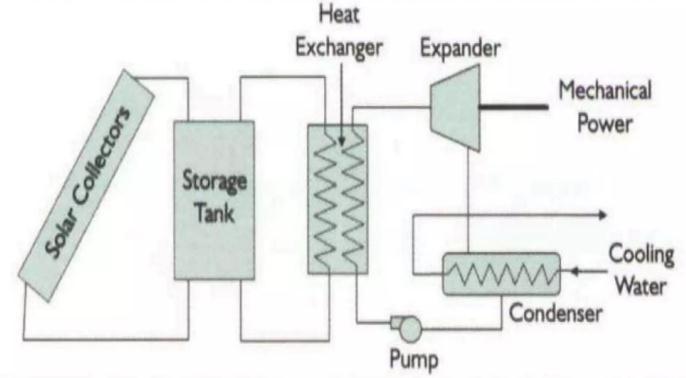
Solar radiation is turned directly to direct current electricity in this technique utilizing semiconducting materials. The functioning of a solar refrigeration cycle driven by PV is straightforward. Solar photovoltaic panels generatedirectcurrent(DC)electricalpower,whichmaybe utilizedtopoweraDCmotorconnectedtothecompressorof avaporcompressionrefrigerationsystem.Theconversionof sunlight into DC electrical power, accomplished by the PV panel,allowsforrefrigeration.Thecompressorispoweredby direct current and circulates refrigerant via a vapor compressionrefrigerationloop that removesheat froman insulated enclosure. The thermal reservoir and a phase transitionsubstancearehousedinthiscontainer.
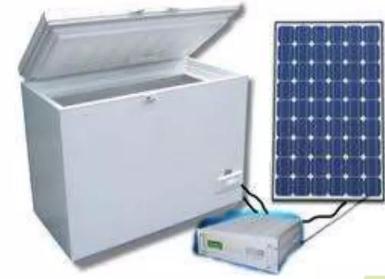
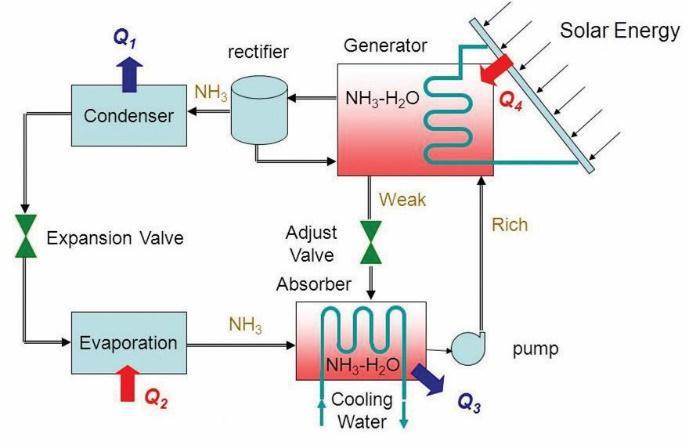
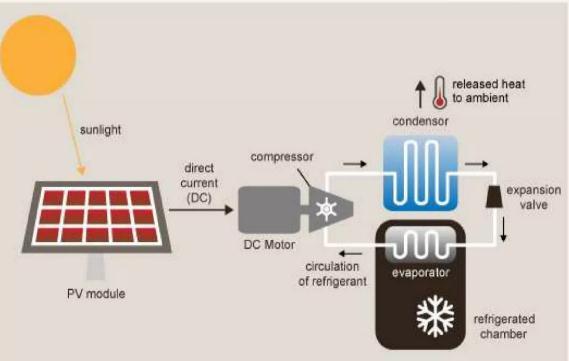


Absorption is the process through which a material transitionsfromonestatetoanother.Thesetwostatesforma strong attraction, resulting in a strong solution or combination. It is one of the earliest types of refrigeration technology.Thefirstabsorptionsystemwasdevelopedinthe 1700s.ItwasdiscoveredthatinthepresenceofH2SO4,pure H2O may be evaporated within an evacuated container to produceice.[8]Itcannotcompetecompetitivelywitheither traditionalvaporcompressionorPVrefrigerators.[6]
Asolarrefrigeratorisacoolingmachinethatusessolar thermal or photovoltaic energy from the sun to protect perishable goods from deteriorating. The sensor has a temperaturerangeof10degreesCelsius.
Solar collector absorption refrigerators employ a combination of water and lithium bromide (water- LiBr). Withthedeclineoftraditionalenergysourcesandtheriseof environmental contamination in the future, solar refrigerationsystemswillbecomeincreasinglypopular.Solar refrigeration may be utilized in freezers, refrigerators, building air conditioning systems, food preservation, icemaking,andcoolers,amongotherapplications.
Asaresult,usingsolarenergymaybeasolutionformeeting theever-increasingenergydemand.Theanticipatedscarcity oftraditionalenergysourcessuchasfossilfuels,aswellas therelatednegativeenvironmentalimpact,aredrivingforces behind the use of solar energy. Refrigeration and air conditioningsystemsareamongthebestcandidatesforsolar energyapplications.Refrigerationisatechniquethatinvolves workingonasystemtoshiftheatfromalowertemperature to a higher temperature in order to have a cooling effect. Refrigerationisusedtokeepaspecificspace'stemperature lower than the surrounding environment. The mechanical deviceremovesheatfromthechilledcompartment,whichis keptatalowertemperature,andrejectsittothesurrounding environment,whichiskeptatahighertemperature.Itisalso utilized to give comfort in hot and humid environments throughtheprocessofairconditioning.Withthedeclineof conventionalenergysourcesandtheriseofenvironmental contaminationinthefuture,itisprojectedthatthissortof refrigerationsystemwillbeemployedmoreandmore.Solar refrigeration may be utilized in freezers, refrigerators, air conditioningsystemsinbuildings,andfoodpreservation.

3. SPECIFICATION OF COLD STORAGE CHAMBER
Table.1 Specification of Cold Storage Chamber [3]
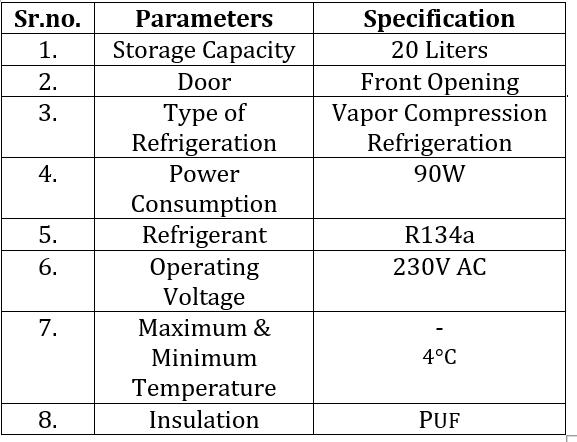
Type of Cold StorageChamber
Fabricateddoublewallchamber withcompositeinsulation
Size of the chamber 0.50mX0.50mX0.50m
VolumeCapacity 125Litres
Hingedoor 0.30mX03.0mX0.038m
Material to be stored
AnykindsofPerishablefoods
4. SYSTEM DESCRIPTION
Under no load and full load situations, the solar photovoltaic refrigeration system was conceived and developed.Toachievetheneededvoltageandcurrent,aPV panel comprised of three modules linked in series was employed. The refrigerator is powered by an alternate current-basedcompressor,similartothoseusedinstandard residentialrefrigerators.[4]
5. APPLICATIONS
Solarenergyshouldbegivenachanceifwewantto protecttheenvironment.
Buildingairconditioningsystems
Foodpreservation
Ice-Making
Freezer’s
6. RESULT
Solar refrigerators are helpful when there's no electricityorit'shardtogetregularfuel.Thismeansthatit can be renewed or used again and again. Regular cooling systemsreleaseharmfulgasesthatdamagetheenvironment.
7.
CONCLUSION
Solar refrigeration system is the need of future. DC power refrigerators should be promoted in rural settings andclinicalinstitutionslikehospitals,alsotherefrigerator casingisnotasairtight.[5]Itisnottoofarthattheworld willfacethescarcityofenergyresourcestosatisfytheneed ofenergyaswellastheneedofrefrigeration.Ithasbetter matrices,size,cost,complexityofsolarrefrigerationsystem requires more size bulkiness, law operating cost, do not overweight,highinitialinvestmentetc.
8.
FUTURE SCOPE
Solarrefrigerationsystemwillbeusedmoreandmore with the decrease of conventional energy sources and the increaseofenvironmentalpollutioninfuture.Solar-powered refrigeratorsareabletokeepperishablegoodssuchasmeat anddairycoolinhotclimatesandareusedtokeepmuchneededvaccinesattheirappropriatetemperaturetoavoid spoilage.
9. ACKNOWLEDGEMENT
I take this opportunity to thanks all those who have contributedinsuccessfulcompletionofthisresearchpaper work. I sincerely wish to express gratitude to our Project Guide “Ms. M.N. Narule” for full support, expert guidance, and encouragement and kind cooperation throughout the work.Iamgreatlyindebtedtoherforhishelpthroughout researchpaperwork.
10. REFERENCES
[1] Hajar, I., & Martianis, E. (2018). Refrigerator Design Using Solar Energy.2018International Conferenceon Applied Science and Technology (iCAST). doi:10.1109/icast1.2018.8751629
[2] Alahmer,A.,&Ajib,S.(2020). Solarcoolingtechnologies: State of art and perspectives. Energy Conversion and Management, 214, 112896. doi:10.1016/j.enconman.2020.112896
[3] M, R., & Rathinam, A. (2018). Effectivepowersharing betweenSolarRefrigeratorandDCMicroGrid.2018IEEE International Conference on Power Electronics, Drives and Energy Systems (PEDES). doi:10.1109/pedes.2018.8707802

[4] SolarRefrigerationSystemChamarthiS,SaxenaA,Ratna S(2015)2319-7064
[5] Tsado,J.,Mahmood,M.K.,Raji,A.G.,Usman,A.U.,&Jiya, I. N. (2018). Solar Powered DC Refrigerator with a Monitoring and Control System. 2018 IEEE PES/IASPowerAfrica. doi:10.1109/powerafrica.2018.852 115810.1109/PowerAfrica.2018.8521158
[6] Review of solid adsorption solar refrigerator I: an overview of the refrigeration cycle. (2003). Fuel and Energy Abstracts, 44(3), 160–161. doi:10.1016/s01406701(03)81820910.1016/s014 06701(03)81820-9
[7] Kim, D. S., & Infante Ferreira, C. A. (2008). Solar refrigeration options – a state-of-the-art review. International Journal of Refrigeration, 31(1),315. doi: 10.1016/j.ijrefrig.2007.07.011
[8] Sarbu, I., & Sebarchievici, C. (2013). Review of solar refrigerationandcoolingsystems.EnergyandBuildings, 67, 286–297. doi: 10.1016/j.enbuild.2013.08.02210.1016/j.enbuild.2013. 08.022
